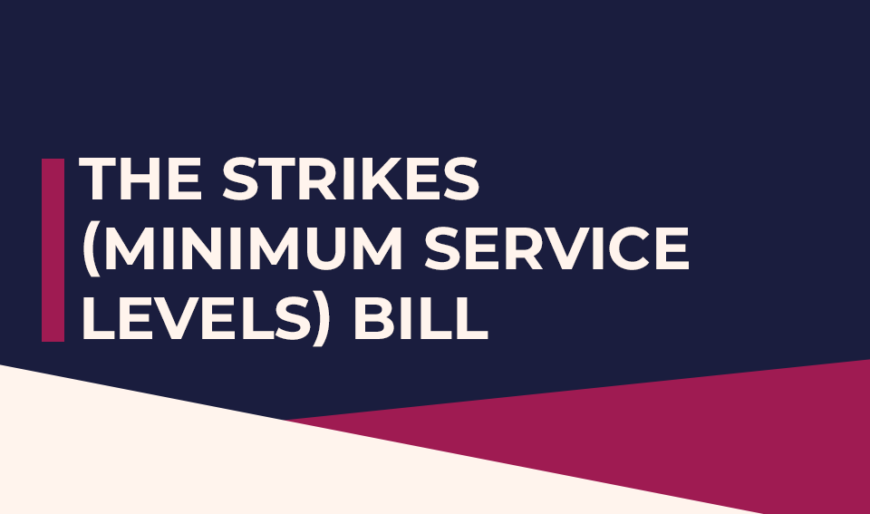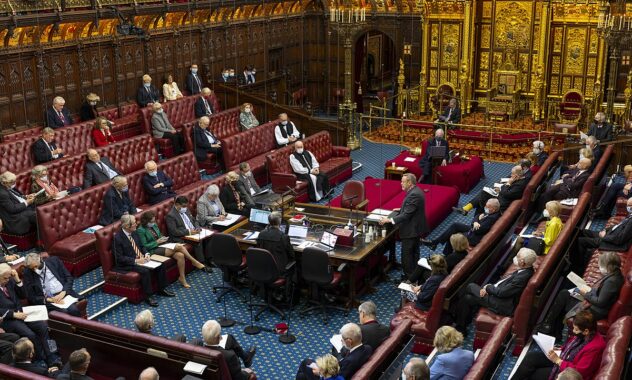Strikes (Minimum Service Levels) Bill returns to the Commons
Controverial legislation returns to Parliament after Government defeats in the Lords

The controversial Strikes (Minimum Service Levels) Bill returns to the House of Commons on Monday, where MPs will have their final vote.
The Government will be seeking to reverse four defeats inflicted in the Lords: on limiting the application of the bill to England only; on removing protections from unions that fail to take reasonable steps to ensure their members comply with work notices; on making failure to comply with a work notice a breach of contract and grounds for dismissal, and on requiring consultation before the government can specify minimum service levels to be maintained during industrial action.
Background to the Bill (via the House of Commons Library)
Legal background
Currently in the UK, police officers, members of the armed forces and some prison officers are prohibited from striking. There are no other general restrictions on public sector workers from striking, although the Trade Union Act 2016 did introduce for the first time the concept of “important public services”, where workers must meet a higher ballot threshold of 40% of eligible voters to strike.
Section 240 of the Trade Union and Labour Relations (Consolidation) Act 1992 also makes it an offence to take industrial action in the knowledge or belief that human life will be endangered or serious bodily injury caused. As a result, many unions such as in the NHS agree to provide so-called ‘life and limb’ cover during strikes.
Under international law, the UK has certain obligations to guarantee the right to freedom of assembly and association, including under Article 11 of the European Convention on Human Rights and Convention 87 of the International Labour Organisation (ILO).
The ILO’s Committee of Experts published a 2012 report (PDF) which discusses the circumstances under which the setting of minimum service levels might be compatible with the convention rights.
Industrial relations background
There were a significant number of public sector industrial disputes throughout 2022, continuing into early 2023, largely related to proposed pay awards that were below inflation, as well as other terms and conditions. These have significantly affected the transport, health, education and border security sectors.
According to the Office for National Statistics, from June 2022 to October 2022, a total of 1.16 million days were lost due to strike action in the UK. 1.39 million days were lost in 2011, which was the highest level since 1990. It is highly likely that the total number of days lost in 2022 will be higher than this once the figures for November and December are published.
Policy background
The Conservative manifesto for the December 2019 general election pledged to introduce legislation to “require that a minimum service operates during transport strikes.” A Bill to this effect was listed in the December 2019 Queen’s Speech, but not introduced in the 2019-21 session or repeated in the 2021 or 2022 Queen’s Speeches.
In the summer of 2022, then Transport Secretary and current Business Secretary Grant Shapps pledged to introduce this measure as part of a 16-point plan to deal with growing industrial action.
On 20 October 2022, the Transport Strikes (Minimum Service Levels) Bill 2022-23 was introduced to the House of Commons. This Bill would allow minimum service levels to be introduced during strikes in certain transport services to be specified by the Secretary of State. The Bill has not received a second reading and has likely been superseded by the Strikes (Minimum Service Levels) Bill.
What would the Strikes Bill do?
The Bill would grant the Secretary of State powers to make “minimum service regulations” which could set minimum service levels required during strikes in any services within six sectors:
- health services
- fire and rescue services
- education services
- transport services
- decommissioning of nuclear installations and management of radioactive waste and spent fuel
- border security
Such regulations would be subject to the affirmative procedure (approved by both Houses of Parliament). Minimum service regulations would be able to affect any strike taking place from the day after they came into force, even if the relevant strike ballot had taken place before this Bill passes.
The Bill would allow an employer to give a “work notice” to a trade union concerning any strike affecting a service subject to minimum service regulations. The work notice would specifiy which workers the employer required to work to ensure the service levels required by the minimum service regulations. They would not be permitted to request more workers than “reasonably necessary” to meet the minimum service regulations.
Where a union fails to “take reasonable steps” to ensure that all workers requested to work by a work notice comply with that notice, it will lose its protection from liability for inducing workers to take part in the strike.
The Bill would also remove automatic protection from unfair dismissal for any employee who takes part in a strike contrary to a valid work notice. Any such employee will not be automatically regarded as unfairly dismissed under Part X of the Employment Rights Act 1996 if the reason or principal reason for the dismissal is because they took part in the strike.
The removal of protected status from any trade union which doesn’t take reasonable steps to ensure all workers comply with work notices also means that in such cases all workers (not just those who act contrary to work notices) who take part in the strike would lose their protection from unfair dismissal.
The Bill also includes a Henry VIII power to amend other primary legislation by regulation, in order make amendments consequential on this Bill.







